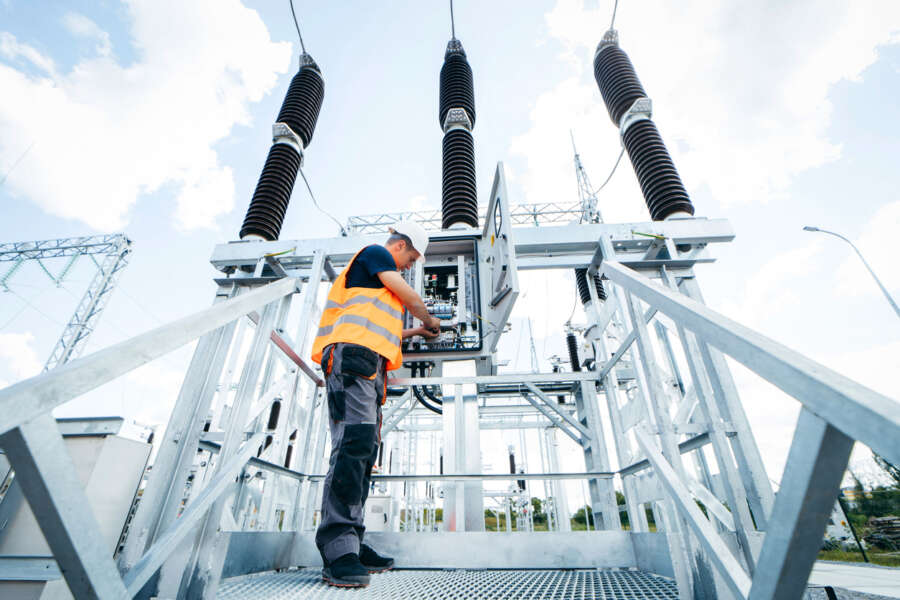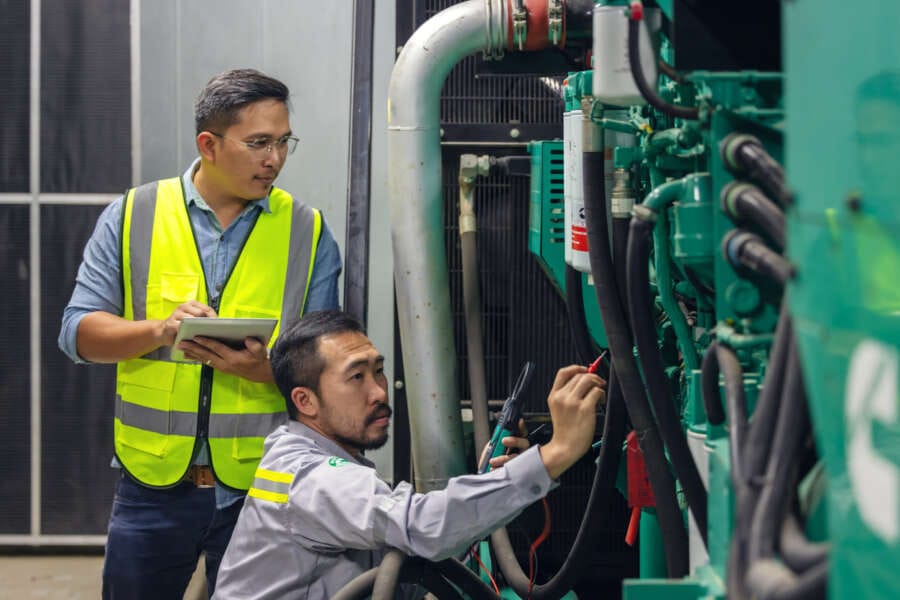
With the world’s demand for energy and power continuing to grow, it is no surprise that jobs in power generation are some of the best paying positions out there. With a variety of roles and responsibilities, these jobs can be found at all levels from entry-level technicians to experienced engineers. Whether you’re looking for a steady paycheck or an opportunity to make an impact on the future of energy, working in power generation could be the perfect fit for you. In this article, we’ll explore some of the best paying jobs in power generation and what skills will help you succeed in them.
Overview Of The Power Generation Industry
The power generation industry is an ever-growing and important sector of the economy. It provides jobs for thousands of people around the world, offering competitive salaries and benefits. The best paying jobs in this field involve working with large-scale energy production systems such as nuclear, hydroelectric, or solar plants. These positions require technical knowledge and experience to operate safely and efficiently while meeting regulatory requirements.
Qualifications And Skills Required For Power Generation Jobs
Qualifications and skills required for best paying jobs in power generation include a degree in electrical engineering, knowledge of current power system regulations, experience with the design and operation of large-scale power systems, expertise in renewable energy sources such as solar or wind, familiarity with software applications relevant to power generation, excellent communication, and organizational skills.
The best paying jobs in power generation include positions in engineering, operations, project management, and maintenance. Engineers are responsible for the design and implementation of efficient energy systems that meet customer needs. Operators manage the operation of power plants and oversee day-to-day maintenance activities such as fuel supply, temperature control, water flow control, and equipment safety measures.
Types Of Jobs In The Power Generation Sector
Power generation is an essential and rewarding sector that provides many different types of job opportunities. From hydroelectric power plants to solar panel farms and more, the power generation industry offers a variety of career paths for those seeking a meaningful profession. Some of the best paying jobs in power generation include lead engineers, maintenance technicians, project managers, and renewable energy specialists.

Power Generation Engineer
Power Generation Engineers are responsible for the design, operation, maintenance, and repair of power generation systems. These professionals work to ensure that all electrical energy generated is safely delivered to its intended destination.
Power Generation Engineers typically have a degree in engineering or a related field and usually specialize in one or more areas such as nuclear power, hydroelectricity, or renewable energy sources. With the growing demand for electricity worldwide, these engineers are highly sought after and can command some of the best salaries in the industry.
Power Generation Engineers must be knowledgeable about complex processes involved in producing electricity and the best practices associated with this critical job. They must have a good understanding of the laws and regulations governing power generation in their area, and they must be able to operate and troubleshoot both existing systems and new technologies.
As such, Power Generation Engineers must be well-trained and experienced professionals who can think critically and act quickly when needed. Excellent communication skills, problem-solving ability, and strong work ethic are also key qualities that potential employers look for in these professionals. With the increasing demand for power generation jobs due to our ever-growing energy needs, there is no doubt that Power Generation Engineers will remain in high demand for years to come.

Electrical System Technician
Electrical System Technicians are one of the best paying jobs in power generation. Working to ensure that electrical systems run safely and efficiently, these technicians can specialize in many different areas. This includes operations, maintenance, troubleshooting, and repairs of transformers, motors, circuit breakers, switchgear, hydraulic control systems, transmission lines, and other electrical power distribution systems.
Electrical System Technicians are responsible for testing and implementing safety procedures as well as control management of the systems. They must remain up to date on best practices and emerging technologies in their field, as this is a rapidly changing profession.

Power Plant Manager
Power Plant Managers play a vital role in the power generation industry, overseeing all aspects of their facilities. They are responsible for ensuring that the power plants they manage operate safely and efficiently, while also managing budgets and keeping up with the latest changes in the field.
These professionals typically have extensive experience in engineering and mechanical operations, along with knowledge of best practices in the industry. As such, they regularly command salaries at the top of the pay scale for power generation jobs.

Turbine Operator
Turbine Operators work in power generation, where they are responsible for the operation and maintenance of a wide variety of turbines. These turbines could be used to generate electricity or to drive other machines.
Turbine Operators must understand the technical aspects of turbine operation, including mechanics, electronics, and hydraulics. They also need to be able to identify and troubleshoot problems with these systems. Most importantly, they must maintain a safe working environment. As one of the best paying jobs in power generation, Turbine Operators can earn competitive salaries based on their experience and skill level.

Mechanical Technician
Mechanical Technicians are highly sought after in the power generation industry, as they play a critical role in keeping equipment running safely and efficiently. Mechanical Technicians oversee the maintenance and repair of mechanical systems such as boilers, turbines, engines, pumps, compressors, and other related machines used to generate electricity.
They also use their problem-solving skills to troubleshoot issues with these systems when they arise. The best paying jobs in power generation typically require at least five years of experience or more as a Mechanical Technician. With proper training and experience, Mechanical Technicians can become invaluable members of any team tasked with generating electricity on a large scale.

Project Engineer
Project Engineers working in the power generation industry are responsible for managing and overseeing projects related to the production of electricity. They coordinate with other engineers, designers, project managers, and technicians to ensure that all aspects of a project run smoothly from start to finish.
Project Engineers must have strong problem-solving skills as well as excellent communication abilities to communicate effectively with colleagues and stakeholders. With their knowledge of best practices in engineering and construction, they help develop plans for efficient power generation systems that meet safety regulations while also meeting customer requirements. Project Engineers often have extensive experience in both electrical engineering and mechanical engineering which makes them highly qualified for best paying jobs in the field of power generation.

Quality Assurance Analyst
Quality Assurance Analysts are essential for ensuring that all power generation systems, from small solar panels to large-scale wind turbines, run as safely and efficiently as possible. Working in this field requires a strong understanding of both engineering principles and best practices for quality improvement.
Quality Assurance Analysts have the responsibility of monitoring and maintaining the performance of power generation equipment, from the initial set-up to the final implementation. This includes testing components with various materials and conditions, troubleshooting any potential faults or errors that arise, and making sure best practices are followed when it comes to safety protocols.
Quality Assurance Analysts must also analyze data collected from various power generation tests and use this information to make decisions regarding the best ways to optimize their systems’ performance. Equipped with exceptional problem-solving skills, these professionals find solutions to even the most complex issues that may arise within a power generation system. With salaries ranging anywhere from $60,000 – $95,000 annually, Quality Assurance Analysts are some of the best paying jobs in power generation today.

Environmental Compliance Officer
One of the best paying jobs in power generation is that of Environmental Compliance Officer. This position entails ensuring that the various operations and processes associated with a power generation facility adhere to environmental regulations and best practices.
The Environmental Compliance Officer will research laws, policies, and best practices, investigate any violations or complaints and develop strategies for maintaining compliance. They must also ensure that all required permits, licenses, and other documents are in place. In addition, they must collaborate with other departments within the organization to ensure that best practices are implemented across all operations on-site.
Environmental Compliance Officers must be knowledgeable about various environmental standards and requirements, as well as industry best practices. They must be able to interpret complex laws and regulations related to the facility’s operations. Communication skills are also essential in this position, as they must be able to explain these rules and best practices to other team members. They must have strong problem-solving abilities so they can quickly investigate any potential violations or discrepancies.
Additionally, they should have experience developing safety plans, monitoring operational data for compliance issues, and conducting regular inspections of the facility’s operations. Furthermore, Environmental Compliance Officers need excellent organizational skills so they can stay organized while managing multiple tasks at once.

Safety and Health Inspector
Safety and Health Inspectors play a vital role in the power generation industry, ensuring that workplace safety standards are met. These professionals inspect production sites regularly to identify any potential risks, such as faulty wiring or hazardous materials, that could be threatening the safety of workers. They also review company policies to ensure they comply with state and federal regulations.
In addition to conducting inspections, Safety and Health Inspectors investigate accidents on-site and compile reports of their findings. They also provide advice and guidance on best practices for reducing workplace hazards.
They must possess a thorough understanding of the laws about workplace safety as well as an aptitude for problem-solving. This position requires a combination of technical knowledge, communication skills, and attention to detail. Safety and Health Inspectors must have strong organizational skills for prioritizing tasks and delegating assignments appropriately. They must also have strong critical thinking skills for weighing the best possible solutions when confronted with hazardous conditions or other unexpected scenarios.
Furthermore, these professionals must be capable of managing large amounts of data and paperwork accurately during investigations or other activities. Ultimately, Safety and Health Inspectors play an essential role in protecting workers from potentially dangerous conditions in the power generation field.

Power Systems Operator
Power Systems Operators are some of the best paying jobs in power generation. They play a critical role in ensuring the safe and reliable operation of the electric grid and its associated components. Power systems operators are responsible for monitoring and controlling electrical systems, such as power plants, substations, transmission lines, and distribution networks. This includes regulating voltage levels, troubleshooting system faults, monitoring equipment performance, responding to emergencies, and managing load flows.
To be successful in this role requires an understanding of engineering principles, electrical theory, and system operations. Power systems operators must also possess strong analytical and problem-solving skills as well as excellent communication abilities to effectively interact with other personnel on the team. Comprehensive knowledge of applicable regulations is also important to ensure compliance with safety standards.
Additionally, power systems operators must have a keen eye for detail to properly inspect all equipment before use or maintenance work is conducted. Moreover, their ability to think quickly is paramount when making decisions that could affect the entire system’s integrity. With such a large responsibility comes substantial financial reward; power systems operators typically make six-figure salaries depending on experience and location. As such, this job is one of the best paying jobs in power generation.
Tips On Landing A Job In This Field
When looking for jobs in power generation, it is best to target the best paying positions. Start by researching a few of the top power generation companies and familiarising yourself with their job descriptions. Check out what kind of salaries they offer and see if any positions fit your background. Networking with professionals who work in this field can also be beneficial – you might be able to learn more about open positions or find out which companies are offering competitive salaries.
Another step you can take is to prepare your resume ahead of time and make sure it reflects the qualifications needed for these higher paying jobs. A well-crafted resume that highlights your experience, education, and skill set will put you at an advantage when applying for these positions. Researching the best paying jobs in the power generation industry is also important, as some positions may require specific certifications or experience.
Finally, having a positive attitude and making sure you practice good communication skills with potential employers can go a long way. Always be professional and show your enthusiasm for the job you are applying for. After all, employers are looking for individuals who demonstrate commitment to their work and will be an asset to the power generation industry.
By following these tips, you can increase your chances of landing one of the best paying jobs in power generation. With hard work and dedication, you too can make a successful career in this field.


